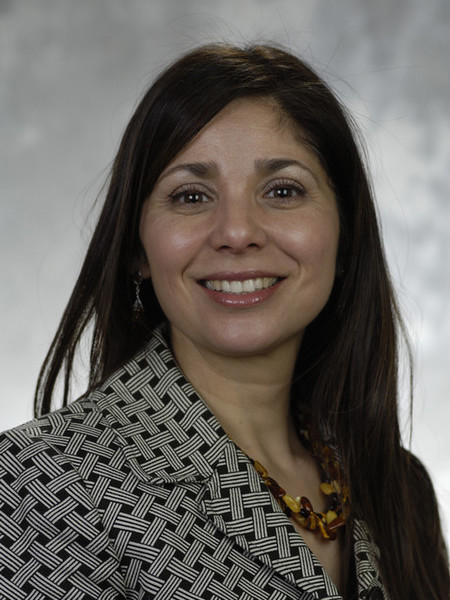
Lydia Rodríguez
She probably had no way of knowing it at the time, but Lydia Rodríguez’s childhood set her up for the career she now has. Learn more about this Department of Foreign Languages professor in this installment of Meet Our Faculty.
What is it about foreign languages that initially drew you in—and ultimately keeps you interested?
Growing up bilingual and bicultural was a privilege that normalized the experience of learning two languages and cultures. It provided me with a unique perspective, allowing me to immerse myself in both worlds, from savoring Thanksgiving turkey dinners with their historical significance to partaking in cemetery lunches with Pedro Infante’s melodies on Day of the Dead, November 2. Practicing cultural traditions and exploring histories were inherent parts of my upbringing.
Maintaining proficiency in both languages and cultures has been invaluable. It enables me to forge meaningful connections and friendships across diverse backgrounds. This proficiency instills a deep sense of satisfaction and confidence, allowing me to seamlessly navigate not only between the two cultures, but also among others. In today’s interconnected world, where multilingualism is a valuable skill, knowing more than one language fosters global understanding and cooperation.
Why do you enjoy teaching in this discipline?
Teaching found me, not the other way around. Yet, I’ve come to cherish teaching Spanish language and literature for several reasons. I passionately believe in preserving and celebrating global linguistic diversity, and teaching allows me to contribute to this vital goal, fostering respect for diverse languages and cultures.
Additionally, Spanish’s widespread, global use empowers me to guide my students in connecting with people from various cultures and regions. There are more people in the world whose first language is Spanish than English. Witnessing students’ progress and fluency in Spanish communication is immensely fulfilling, especially when they develop a deep appreciation for the language and its associated cultures.
Moreover, literature in Spanish provides a profound window into the cultures, history, and values of Spanish-speaking societies. Teaching it enables me to explore the cultural nuances within texts, offering students a richer understanding of the societies that produced these works. Furthermore, studying literature enhances students’ language proficiency, exposing them to intricate vocabulary, diverse grammatical structures, various narrative styles, and poetic language, enriching their language skills.
With its centuries-spanning, rich literary tradition, Spanish literature remains a constant source of fascination and learning for my students. That’s why I integrate Spanish literature into all my classes, from basic to advanced levels.
What advice would you give students about how to succeed in college?
Keep pushing forward. College demands mental toughness, but don’t give up when the going gets tough. Stay responsible, disciplined, and committed.
Master time management—it’s essential. Craft a schedule or use a planner to allocate time for classes, study sessions, assignments, and personal activities. This organization will help you meet deadlines and reduce stress.
Never be afraid to seek help. Whether you’re grappling with course material or personal challenges, reach out to professors, peers, academic advisors, tutors, or counseling services. We are here to support both your academic and emotional well-being.
Expect obstacles; it’s part of the journey. Maintain your determination and resilience. Learn from your setbacks and keep forging ahead. Success often rewards those who persist.
After all, college is a path of personal growth and development. Embrace it with enthusiasm, embrace new experiences, and actively pursue opportunities for learning and self-improvement. Your success isn’t solely defined by grades, but also by the skills and knowledge you acquire along the way.